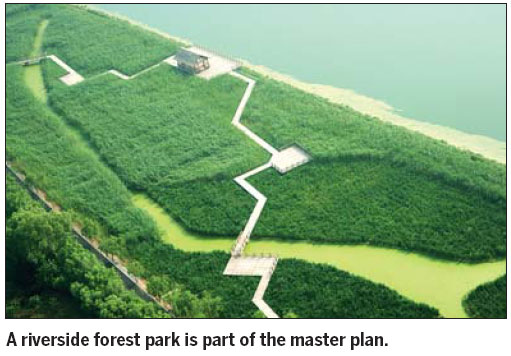|
The 15-sq-km zone will be a comprehensive development including hospitals, research and education institutions, and a full range of support facilities. |
|
The site of the planned international medical service zone is near the Beijing-Hangzhou Grand Canal. |
East Beijing district to be home for top healthcare
Medical services that meet globally advanced standards are seen as an important benchmark for cities like Beijing to become truly international metropolises.
The capital city's government is making plans to reach the goal with the Beijing International Medical Service Zone scheduled for development over the next decade in the eastern Tongzhou district.
Designed as a home for a number of high-end hospitals and related research institutions, the zone surrounded by three rivers and close to a sprawling forest park will cover 15 square kilometers.
A press conference on Sept 17 will announce more details about the project to attract interested investors.
Modern medical services are now an investment hotspot in China due to increasing demand from both foreigners and locals.
Government policies also favor the trend. In 2009, the State Council released a guideline calling for deepening reforms on the medical and healthcare system. A year later, another notice issued by the State Council encouraged non-governmental and foreign capital to invest in medical institutions.
According to the local authorities, the new zone will offer not only a good natural environment, but also convenient transportation.
It will be connected to downtown Beijing by a rapid bus line and a new subway route currently under construction. Several highways also link the area to the greater metro area.
The target is to develop the area into a world-class medical service industry park using mostly non-governmental investment and operated by market economy principles.
To formulate the blueprint, local officials and professionals responsible for construction of the new medical zone visited and studied similar industrial parks, hospitals and institutions abroad. They talked to experts in more than 20 leading medical research institutions at both home and abroad to map out the project.
The design calls for high-end medical services offered by both for-profit and non-profit hospitals, either wholly owned or publicly held through stock shares.
Target customers are those with complicated or severe diseases or who want high-end, individualized medical services and health management advice. The concept is primarily designed to offer medical services to returning overseas talent and foreigners who work and live in Beijing.
Best resources
The first phase of the project will have one or two comprehensive hospitals and eight to 10 specialized hospitals offering treatment in cardiovascular disease, oncology, gynecology, pediatrics and cosmetics.
It also reserves an area for hospitals, research institutions and clubs for traditional Chinese medical science, which is expected to be a distinguishing feature of the zone.
The zone will also house educational institutions including Peking Union Medical College, a nursing college and a business school with medical-related disciplines such as hospital management.
A national-level center for medical science transfer will also be set up in the zone. Professionals at the center will mainly specialize in oncology, neurology and sports medicine to accelerate the transition from development of treatment to clinic applications.
It will also have apartments, international schools - from kindergarten to high school - and hotels as support facilities.
The overall population in China is aging, so the zone will also develop a service complex for the elderly.
Complete value chain
The master plan envisions a complete value chain that starts from medical services and extends to research and development, academic exchanges and even trade fairs and tourism.
Through the value chain, the medical industry is expected to drive growth in local GDP, taxes, employment and consumption, according to planners.
Preliminary agreements have been made for projects in the zone with Peking Union Medical College, the east branch of the Fuwai Hospital on Cardiovascular Diseases, Children's Hospital of Los Angeles, the Chinese Medicine Industrial Park and Beijing-Harvard Hospital - a part of the China-US Friendship Medical Center.
The entire project was designed by HDR Inc from the US, a famed architect of healthcare buildings.
Part of the design work - including buildings for Chinese medicine, healthcare, rehabilitation and tourism - was done by the Urban Planning and Design Institute at prestigious Tsinghua University.
Leading global companies IBM and GE Healthcare are responsible for programming the information system of the zone.
China State Construction, the biggest construction and property development company in the country, will be in charge of building the infrastructure and support facilities.
CITIC Securities will offer financial consultancy and help bring in funding.
With such noted partners, each of them leaders in their fields, local officials and planners of the project expect to have a truly high-standard medical zone in Tongzhou.
Construction of main roads and a public service center is scheduled to begin in 12 months. The zone's management also plans to hold a global promotion to attract more investment.
The planners expect to complete the first phase of construction in five years. Within a decade, they envision an industrial chain will begin to take shape with clusters of the renowned hospitals and institutions.
hantianyang@chinadaily.com

|
The first phase will include one or two comprehensive hospitals and eight to 10 specialized hospitals. Photos provided to China Daily |
(China Daily 09/14/2012 page15)
